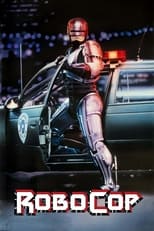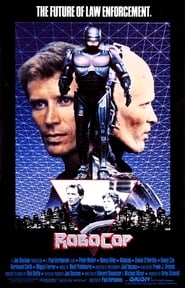Will I Rent RoboCop?
Wiki Article
A few years from now, Detroit will be a gangster's paradise. The Omni Corporation "purchased" the police department when the city entered bankruptcy. And thus the streets are now dominated by thugs, thieves, assassins and rapists.
Officer Murphy (Peter Weller) has been assigned to the worst precinct in the city. While on patrol, he and his new partner, Officer Lewis (Nancy Allen), react to a complaint that leads to a fight with Clarence Boddicker (Kurtwood Smith) and his gang, arguably the city's most dangerous criminals. Murphy is confronted and fatally shot by Boddicker's men in an abandoned warehouse.
Robocop is a fantastic blend of science fiction and action, with many of memorable sequences. The opening confrontation between Murphy and Boddicker's group is brutal as hell (Boddicker blasts Murphy's hand off with a shotgun), and Verhoeven gives us every bloody detail of it (in the uncut version, anyway). Dick Jones is demonstrating his own pet project, the ED-209, an intimidating robot with a powerful weaponry, in the Omni Corporation's board room in another graphic scene. Unfortunately, the ED-209 has a few flaws that need to be ironed out, as Kinney (Kevin Page), a young executive who volunteered to be a test subject, discovers when it blasts him away!
When Robocop takes to the streets, the action intensifies, particularly when he's up against Boddicker and his henchmen. Robocop stumbles into a heist in process on his first night out, with Emil (Paul McCrane), one of Boddicker's men, threatening a gas station employee with an automatic rifle. This meeting not only provides a thrilling action sequence, but it also brings back memories for Robocop, who remembers his old existence after identifying Emil as one of Murphy's murders.
Not content with that, Robocop explores what it means to be human, with a changed body but not memories. Verhoeven's picture has a lot to say about the human condition by focusing on corporate greed, widespread crime, and personal identity (which comes into play when Robocop/Murphy remembers his life before the suit).
He thinks he can make better police officers by mixing robotics with human brains. This is what the young scientist thinks. This is what the young scientist thinks. Then Peter Weller, a hero cop, is killed in the line of duty. He gets his chance when he does. Well, not yet. The first "robocop" is built around that human core. It's a half-man, half-machine that runs with perfect logic, except for the shards of human spontaneity and intuition that may be lurking somewhere in the background of its memory.

Nancy Allen plays Weller's companion before he was shot. She notices something familiar about the robocop and identifies it: Her former buddy Weller is inside that steel outfit. Because Weller's original nose, mouth, chin, and jaw are visible, she shouldn't have had to guess. His creator evidently believes with Batman and Robin that you can't identify someone until you can see their eyes.
He does a remarkable job of building empathy for his character, while spending much of the film disguised beneath some form of makeup gadget or another. This character is more "human," in the movie's second half, as opposed to the first. His story is compelling, and Nancy Allen does an excellent job as his tenacious companion wanting to find out what happened to him in the first place.
Most thriller and special-effects movies come right off the assembly line. You can call out every development in advance, and usually be right. "RoboCop" is a thriller with a difference.
The Take
In 1987, RoboCop had a broad North American rollout. On its first weekend, the movie earned $8 million from 1,580 screens, an average of $5,068 per screen, exceeding all expectations. Re-releases of Snow White and the Seven Dwarfs and Jaws: The Revenge, both in their first week of release, were the weekend's second and third highest-grossing films, respectively. With an extra $6.3 million in its second weekend, RoboCop held on to the top spot, beating Snow White ($6.05 million) and Summer School ($6 million) to the top spot. After La Bamba ($5.2 million) and the horror debuts of The Lost Boys ($5.2 million) and The Living Daylights ($11.1 million), RoboCop came in at number four with a take of $4.7 million.
RoboCop never reclaimed the top place, but stayed in the top 10 for a total of six weeks. The picture earned $53.4 million at the conclusion of its theatrical run, making it a minor success. After Crocodile Dundee ($53.6 million), La Bamba ($54.2 million), a comedy picture, and Dragnet ($57.4 million), it was the fourteenth highest-grossing film of the year. Outside of North America, no figures for the film's performance are known.
Critical Response

RoboCop premiered to mostly good reviews. CinemaScore reports that audiences awarded the picture a "A–" score on average.
Aliens (1986) action, Frankenstein (1931) story, Repo Man (1984) and the television series Miami Vice influenced critics. Like Blade Runner did for Los Angeles, RoboCop created a unique future image for Detroit, said two critics. The film's genre was described as combining social satire, philosophy, action, science fiction, thrillers, Westerns, slapstick humor, romance, snuff pictures, superhero comics, and kitsch without being derivative.
A lot of publications thought Verhoeven's direction was smart and darkly funny, with sharp social satire that, the Washington Post said, would have been just a simple action movie if it had been directed by another person. Many other people thought the movie was too directed, with Verhoeven's European filmmaking style not having rhythm, tension, or momentum. This is what the Chicago Reader said about Verhoeven's ability to show the "sleazily psychological" through physicality: He didn't use RoboCop's "Aryan blandness" well. A lot of people liked Weller's performance and how he was able to make people feel bad and be kind even though his costume was bulky. The Washington Post and Roger Ebert both said that this was one of the best performances they had ever seen. The Washington Post said that Weller had a kind of beauty and grace that made his death even more terrible. Weller, on the other hand, didn't even show up for the Chicago Reader. It was said that Nancy Allen was the only person who was kind in the movie, and Kurtwood Smith was a well-cast "sicko sadist"
riffsandreviews.blogspot.com Decker Shado's site
The Movie Database
